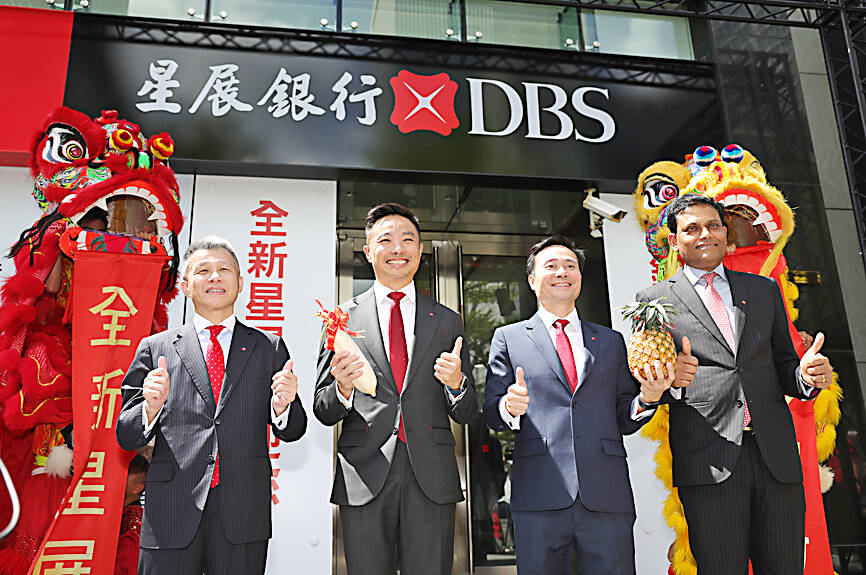DBS Bank Ltd (DBS) has completed its acquisition of Citigroup Inc’s consumer banking business in Taiwan over the weekend, it announced yesterday.
The move came as DBS seeks to augment its presence in key Asian markets where Citi is downsizing as part of a strategic refresh.
The Singaporean banking group said the transaction — including Citi’s retail banking, credit card, mortgage and unsecured lending businesses, as well as the transfer of nearly 3,000 employees — allowed it to become the largest foreign lender in Taiwan by assets.

Photo: CNA
DBS Bank Taiwan (星展台灣) now has a clear lead in loans, deposits, credit cards and investments among foreign players, the Singaporean banking group said in a statement.
Its number of consumer banking customers has more than doubled to more than 1.1 million, while total loans soared 1.5 times and deposits spiked 1.6 times, it said, adding that credit card accounts grew fivefold to more than 3 million.
DBS Group Holdings Ltd chief executive officer Piyush Gupta said that the integration of Citi Consumer Taiwan fell in line with the group’s strategy to build meaningful scale in core Asian markets.
“By bringing a prized Citi franchise into our fold, we accelerate our consumer business growth in Taiwan by at least 10 years,” Gupta said in the statement.
“We will be able to provide more value to our customers, helping them grow their wealth through innovative products, and helping business owners expand into new markets or participate in regional trade flows,” he said.
DBS Taiwan general manager Ng Sier Han (黃思翰) said he welcomed new Citi colleagues to the DBS family and described the transition as seamless.
The enlarged franchise gives the bank greater opportunity to offer best-in-class products and services to its customers, Ng said.
Citi said that its institutional client businesses in Taiwan were excluded from the sale as it remains focused on serving that segment in Taiwan.
“As we conclude the sale of our consumer business in Taiwan, we remain committed to growing our market-leading institutional franchise and supporting clients in the market and across the region through our global network,” Citi Asia Pacific CEO Peter Babej said.
Since announcing its intention to exit consumer banking across 14 markets in Asia, Europe, the Middle East and Mexico as part of its strategic refresh, Citi has signed sales agreements in nine markets and has closed sales in eight: Taiwan, Australia, Bahrain, India, Malaysia, the Philippines, Thailand and Vietnam.
Citi plans to complete the sale of its Indonesia consumer business later this year. The previously announced wind downs of Citi’s consumer business in China and South Korea and overall presence in Russia are in progress, it said in a statement.
Citi also said it would pursue an initial public offering of its consumer, small business and middle-market banking operations in Mexico, and would restart the exit process for its consumer banking business in Poland later this year, subject to market conditions.

Nvidia Corp chief executive officer Jensen Huang (黃仁勳) on Monday introduced the company’s latest supercomputer platform, featuring six new chips made by Taiwan Semiconductor Manufacturing Co (TSMC, 台積電), saying that it is now “in full production.” “If Vera Rubin is going to be in time for this year, it must be in production by now, and so, today I can tell you that Vera Rubin is in full production,” Huang said during his keynote speech at CES in Las Vegas. The rollout of six concurrent chips for Vera Rubin — the company’s next-generation artificial intelligence (AI) computing platform — marks a strategic

REVENUE PERFORMANCE: Cloud and network products, and electronic components saw strong increases, while smart consumer electronics and computing products fell Hon Hai Precision Industry Co (鴻海精密) yesterday posted 26.51 percent quarterly growth in revenue for last quarter to NT$2.6 trillion (US$82.44 billion), the strongest on record for the period and above expectations, but the company forecast a slight revenue dip this quarter due to seasonal factors. On an annual basis, revenue last quarter grew 22.07 percent, the company said. Analysts on average estimated about NT$2.4 trillion increase. Hon Hai, which assembles servers for Nvidia Corp and iPhones for Apple Inc, is expanding its capacity in the US, adding artificial intelligence (AI) server production in Wisconsin and Texas, where it operates established campuses. This

Garment maker Makalot Industrial Co (聚陽) yesterday reported lower-than-expected fourth-quarter revenue of NT$7.93 billion (US$251.44 million), down 9.48 percent from NT$8.76 billion a year earlier. On a quarterly basis, revenue fell 10.83 percent from NT$8.89 billion, company data showed. The figure was also lower than market expectations of NT$8.05 billion, according to data compiled by Yuanta Securities Investment and Consulting Co (元大投顧), which had projected NT$8.22 billion. Makalot’s revenue this quarter would likely increase by a mid-teens percentage as the industry is entering its high season, Yuanta said. Overall, Makalot’s revenue last year totaled NT$34.43 billion, down 3.08 percent from its record NT$35.52

PRECEDENTED TIMES: In news that surely does not shock, AI and tech exports drove a banner for exports last year as Taiwan’s economic growth experienced a flood tide Taiwan’s exports delivered a blockbuster finish to last year with last month’s shipments rising at the second-highest pace on record as demand for artificial intelligence (AI) hardware and advanced computing remained strong, the Ministry of Finance said yesterday. Exports surged 43.4 percent from a year earlier to US$62.48 billion last month, extending growth to 26 consecutive months. Imports climbed 14.9 percent to US$43.04 billion, the second-highest monthly level historically, resulting in a trade surplus of US$19.43 billion — more than double that of the year before. Department of Statistics Director-General Beatrice Tsai (蔡美娜) described the performance as “surprisingly outstanding,” forecasting export growth